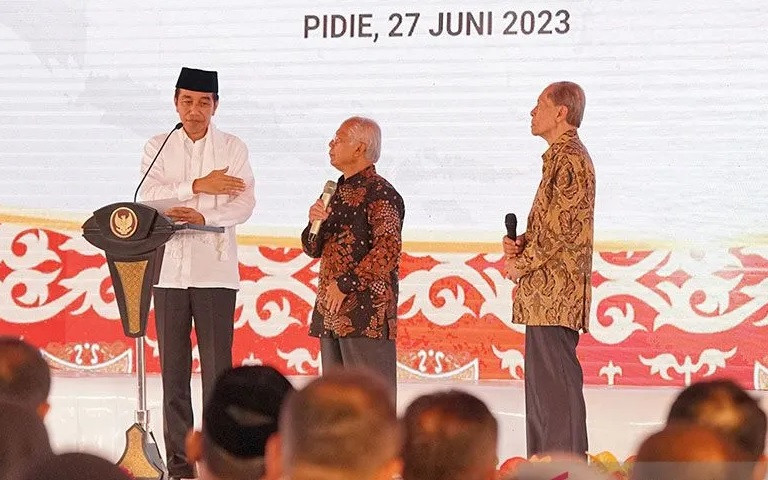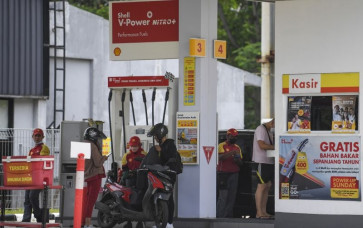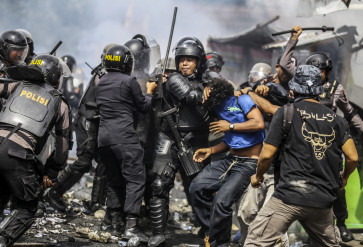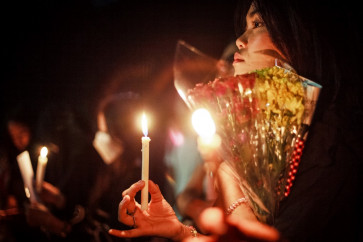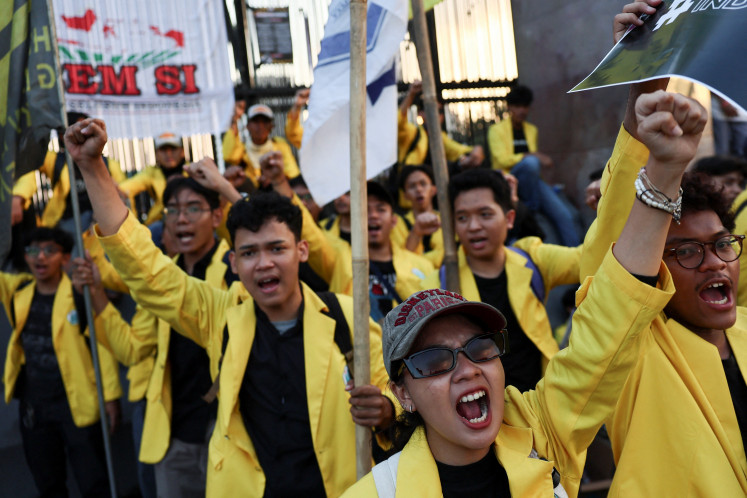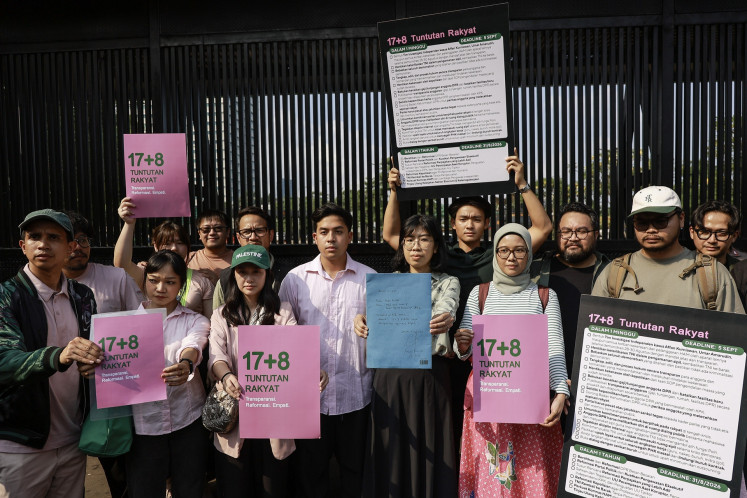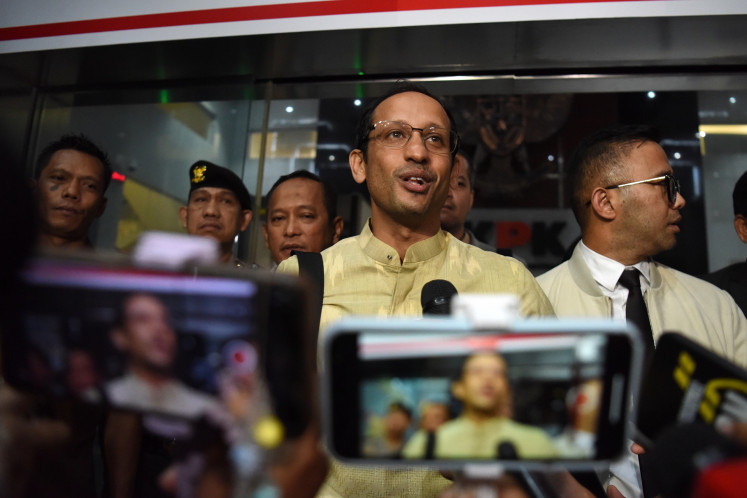Popular Reads
Top Results
Can't find what you're looking for?
View all search resultsPopular Reads
Top Results
Can't find what you're looking for?
View all search resultsReparations program gets mixed welcome
Government promises that legal recourse could still follow.
Change text size
Gift Premium Articles
to Anyone
P
resident Joko “Jokowi” Widodo sought on Tuesday to make good on a long-standing campaign promise, launching a program to compensate victims of past gross human rights violations while keeping the door open to legal recourse.
The nonjudicial settlement program offers reparations and state-sanctioned benefits to those who suffered in 12 officially recognized historic cases of serious human rights abuses that occurred mostly during the dictatorship years.
It had taken the Jokowi administration more than nine years to finally address Indonesia’s gloomy past, partly due to difficulties in vetting incidents from decades ago.
Reservations by the Indonesian Military (TNI), whose members are allegedly among the perpetrators, had also kept any legal efforts from progressing, despite constant criticism.
Speaking during the launch ceremony in Pidie, Aceh province, the President insisted that in-court settlement and nonjudicial means could go hand in hand, noting however that the current method was the most convenient way to resolve serious rights violations.
Earlier this year, Jokowi acknowledged and expressed regret over 12 major incidents of violence and repression in the country between 1965 and 2003 that amounted to gross human rights violations.
The incidents include the communist purge of 1965-66, the Semanggi I and related Semanggi II tragedies that led to the fall of the New Order, the Jambu Keupok tragedy, the Simpang KAA tragedy and killings and torture that occurred in Rumoh Geudong in Aceh.
This list of cases came about as part of an 11-point recommendation that a government-led team submitted to the President in January. Among the other points raised were the need for the state to acknowledge and express regret over past atrocities, the restoration of victims’ rights and the establishment of an oversight mechanism.
“The government sincerely intends to carry out the 11 recommendations,” the President said in his remarks.
The government has not disclosed the exact number of people who will be eligible for reparations, or any targets and it is unclear how victims can apply for compensation.
An implementation team was established in March, to be advised by Coordinating Political, Legal and Security Affairs Minister Mahfud MD.
The team’s mandate could be extended into next year, Jokowi said, if it fails to implement the recommendations by the end of December. He did not elaborate on the program’s continuity after his tenure ends next year.
Tuesday’s ceremony was carried out at a carefully chosen site, as it had been used by the TNI for torture during the Aceh conflict, according to records from a truth-seeking mission.
For nine years, from 1989 to 1998, Rumoh Geudong was used as a venue for the torture of civilians accused of being affiliated with the Free Aceh Movement (GAM).
In 1998, the original building was destroyed by locals out of fear that it would be reused by the military for the purpose of human rights abuse.
In 2018, at the initiative of the victims, a monument was erected to serve as a reminder of past atrocities committed by the state.
Just days before Tuesday’s ceremony, however, part of the structure that occupied the site was demolished, apparently without consulting the victims or their families, thus triggering a chorus of condemnation from human rights activists.
The government plans to rebuild the site as a park and a mosque to remind people that gross rights violations occurred at Rumoh Geudong. The monument built in 2018 is to be moved to adapt to the construction plan.
Two political exiles were invited to Tuesday’s ceremony: Sudaryanto Yanto Priyono, 81, who now lives in Russia, and Jaroni Soerjomartono, 80, who resides in the Czech Republic.
As former overseas Indonesian students who were stripped of their citizenship during the 1965 communist purge, they were symbolically given benefits under temporary stay permits (KITAS) from the President, which allow them to continue holding foreign citizenship.
Indonesia does not recognize dual citizenship, but both Yanto and Jaroni applauded the government for allowing them the convenience of being able to visit their homeland.
Disappointed
Marniyati, 56, a victim of the Rumoh Geudong abuse, went home from the ceremony with disappointment on her face after receiving a government stipend of Rp 1 million.
Having suffered torture at the hands of members of the Army’s Special Forces (Kopassus) stationed at Rumoh Geudong, she bemoaned the meager compensation she received.
Marniyati said she had expected that the government would provide her children with scholarships as she could not work and her husband was too old.
“We must pay for our children’s tuition and religious study fees. One of my children was born near Rumoh Geudong. I hope the President can help us out,” she said after the ceremony.
Separately, Maria Catarina Sumarsih, the mother of a student who was shot dead during protests in the Semanggi I tragedy in November 1998, said she was unconvinced by the sincerity of the President.
She said nonjudicial means of settlement were not enough and urged the government to bring the perpetrators to justice.
Meanwhile, National Commission on Human Rights (Komnas HAM) chairperson Atnike Nova Sigiro applauded the reparations program but stressed that the government still had a responsibility to ensure that such bloody events would never occur again.
“The judicial mechanism is another form of accountability to bring about justice for the victims and ensure there is some sort of deterrent effect,” she said.
Research by Komnas HAM, in cooperation with civil society groups, has estimated there are between 500,000 and 3 million victims and survivors of the 1965 bloodshed.

